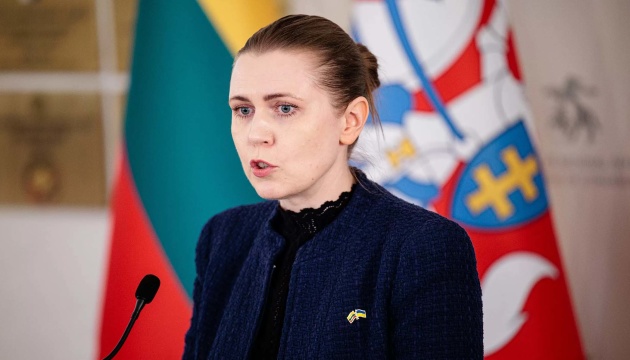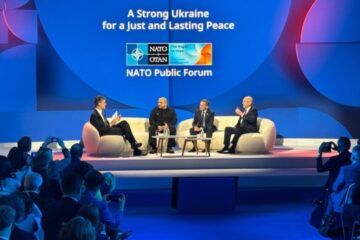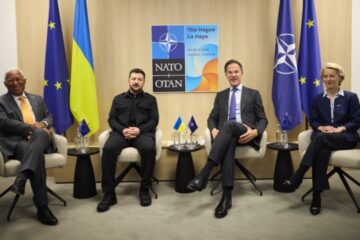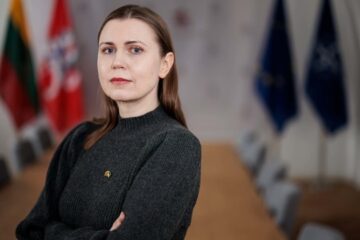One of the most widely discussed international events this week is the NATO Summit in The Hague, where decisions are expected that may prove crucial for the security of Europe and the world for decades to come. The meeting takes place against the backdrop of Russia’s ongoing war against Ukraine, a shifting geopolitical landscape following the start of Donald Trump’s presidency, and an unprecedented escalation in the Middle East, including U.S. strikes on Iran’s nuclear and military facilities.
In this exclusive interview with Ukrinform, Lithuania’s Minister of National Defence, Dovile Sakaliene, discusses these and other global security challenges — particularly for NATO — the prospects of Ukraine’s membership in the Alliance, the growing threat posed by Russia and ways to contain it, the levers of influence on Moscow to end its full-scale aggression, Lithuania’s defense strategy, the future of transatlantic security, and the conditions necessary to achieve lasting peace in Europe.
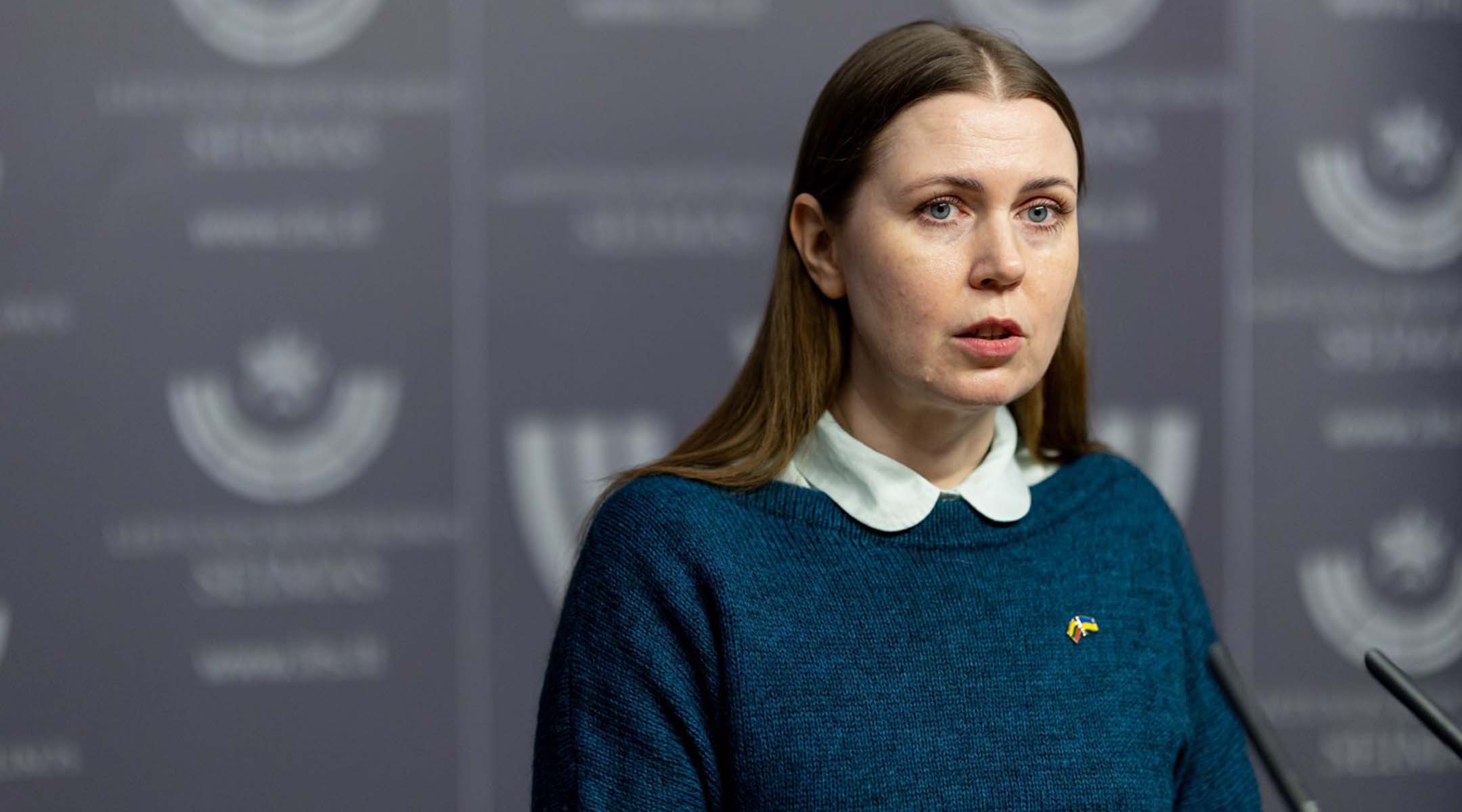
– Madame Minister, the NATO Summit is just around the corner. What are the main messages and priorities Lithuania plans to bring to the table?
– First of all, defense investment pledge. This is crucial not only for NATO, but also for Ukraine – because the stronger we are as NATO, the stronger the NATO-Europe bloc is, and the more support we can provide to Ukraine. Therefore, Lithuania is very clear: reaching 5% as soon as possible is not a choice, it’s a necessity. And therefore, first part of the message is the number. We believe that 5% is the minimum.
The second part of the message is the deadline. We believe that anything beyond 2030 is too late. We anticipate difficult discussions and we’re still going to hold our position: 2030 must be the latest possible deadline.
And of course, a cross-cutting message for everyone is support for Ukraine. We believe that the best safeguard for sustainable peace and stability in Europe is a strong Ukraine. That means strengthening the Ukrainian army and continuing vital support. We are going to keep doing that. And I hope there will be some announcements during this summit regarding further support for Ukraine, especially from the European part of NATO.
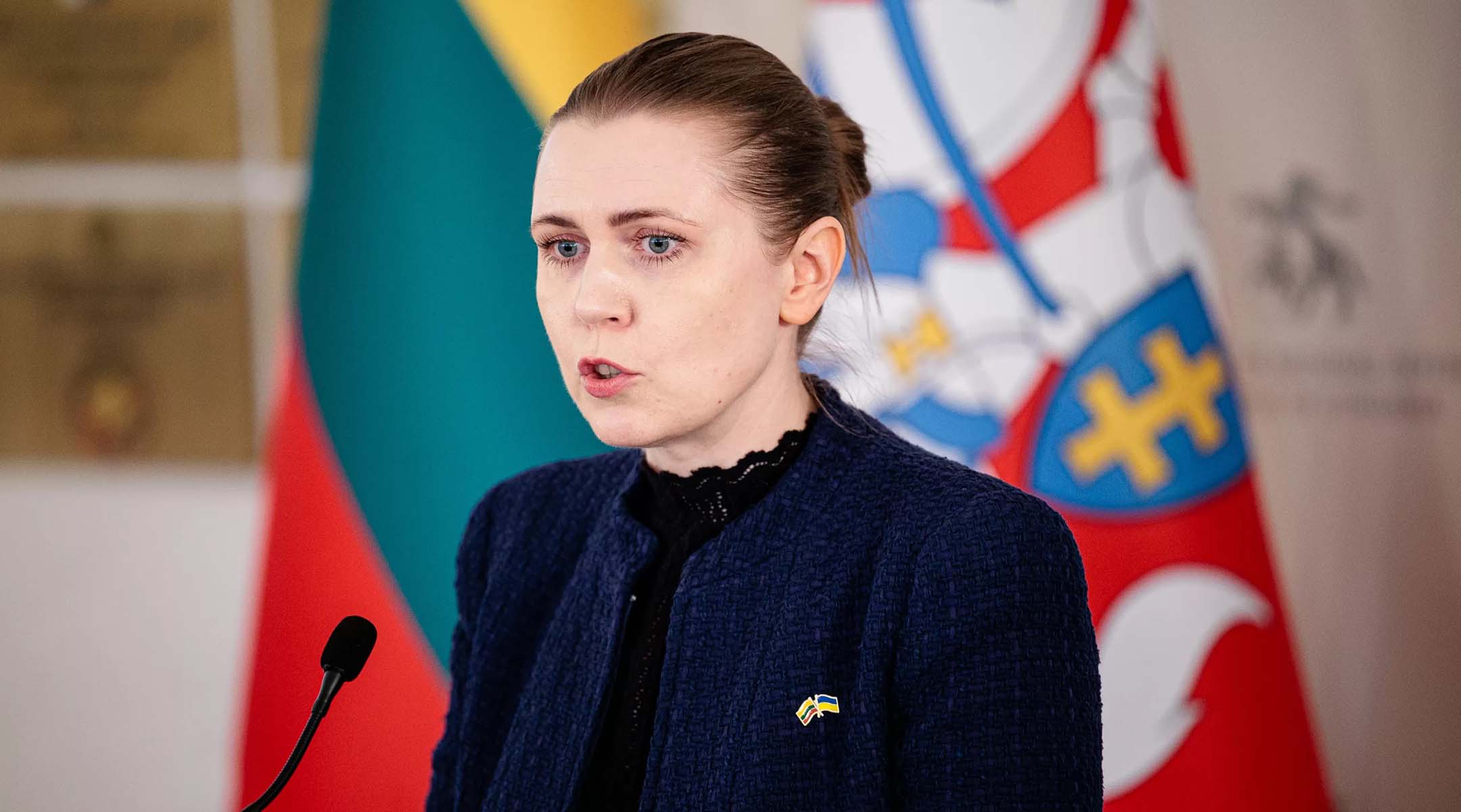
Photo: ELTA
UKRAINE’S EXPERIENCE, MILITARY CAPABILITIES AND DEFENSE INDUSTRY WOULD BE A MAJOR CONTRIBUTION TO NATO
– Lithuania has been a strong supporter of Ukraine’s NATO membership, viewing it as essential for long-term security. But realistically, how likely is Ukraine’s accession while the war is still ongoing?
– Of course, this is a very difficult situation. And let’s divide this question into two parts. First, regarding NATO membership itself. Since accession requires consensus, all NATO members must agree. Lithuania’s position is clear and unwavering: we will always support Ukraine joining NATO. This is not only a matter of principle and values. From a human perspective, it is deeply personal to us. We see how Russia is trying to annihilate Ukraine – and as a nation that has been occupied by Russia twice over the past centuries, we understand all too well what it means to face such existential threats.
But beyond that, from a strategic and even pragmatic standpoint: Ukraine is currently the only European country with real, direct battlefield experience against the greatest threat to European security – Russia. Ukraine’s experience, your military capabilities, and your defense industry are tremendous assets. They would be a major contribution to NATO, and particularly to the European bloc of the Alliance. That is why we see Ukraine’s future NATO membership not only as justified but as a vital and valuable addition.
Now, second part of the question regarding the timeline. Lithuania itself had to wait 14 years from the moment we expressed our desire to join NATO until our membership was finalized. We know what it means to fight for it for quite a long time.
Currently, there are ongoing discussions and differing views among NATO members. But we remain committed to supporting Ukraine’s aspirations and hope that consensus can be reached as soon as possible — ideally, once active hostilities come to an end, in accordance with the current legal framework.
RUSSIAN AGGRESSION MEANS THERE IS NO SAFE PART OF EUROPE ANYMORE
– Madam Minister, you mentioned a defense investment pledge. Lithuania spends more on defense as a share of GDP than most NATO countries. Why do you think some allies are still hesitant to invest more despite growing threats? And what risks might this pose in the future?
– Well, first of all, I think that everyone agreed that high defense spending, significantly higher and immediately is a necessity. What we are facing is domestic policy issues, domestic policy challenges, which are reflected on the global agenda.
Of course, certain economic processes, certain political choices by different governments all over Europe influence decisions regarding the speed and the size of the defense investment. That’s understandable. Political processes are never easy. They are always complicated.
I would dare to say from my side that defense ministers understand that Russia is a looming threat over Europe and that we have to respond by very visible, objective actions, by significant increase in our troops, significant increase in the capacity of defense industry, significant increase in training areas, significant increase in weapons and equipment acquisitions. Russia doesn’t really care about papers and declarations – they care about is what they see on the ground. We all understand that we need to invest. The question now is the speed — and that comes down to political will and negotiations.
That’s why it’s critical to send a clear message to societies across Europe: the difference between a country on NATO’s eastern or northern flank — like the Baltic states, Poland, or Finland — and a country in the south of Europe is only five minutes in the case of a ballistic missile. So this should not be seen as someone else’s problem. There is no such thing as a “safe” part of Europe anymore.
At the same time, we must acknowledge that recent years have been exceptionally turbulent — from the pandemic to shifting geopolitical dynamics and the rise of conflicts across various regions. Just looking at the Europe–Indo-Pacific–Middle East triangle reveals how tense the global environment has become. And in the other regions of the world, of course, situation is also quite tense.
So therefore, there is a lot on the plate of many states, especially from the south. And maybe also we have to admit that we have not always been attentive enough to the concerns that our southern neighbors in Europe have had regarding migration and terrorism. There is also this price for maybe not being able to hear them well enough years ago. And now we have to prove our case better.
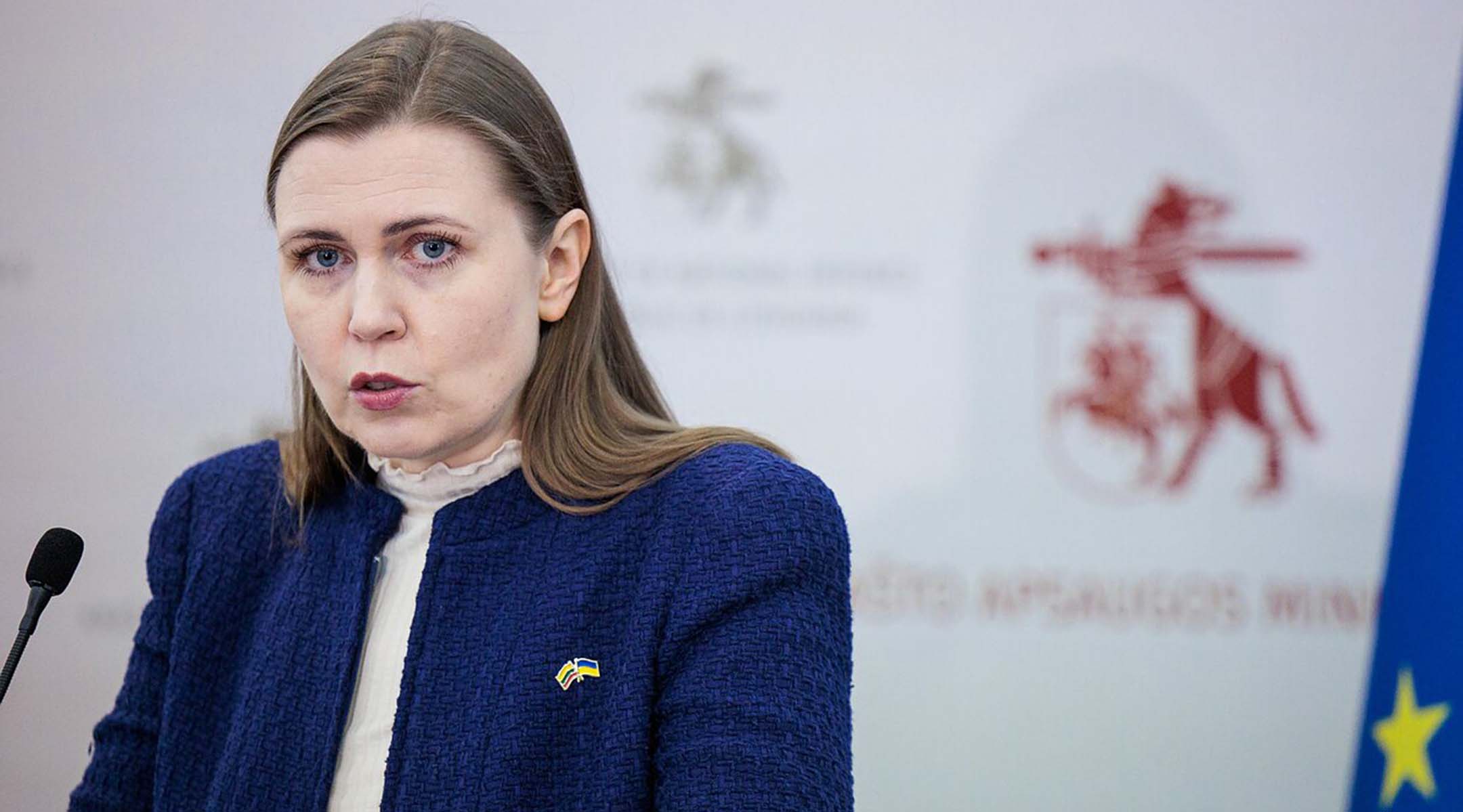
– You recalled that Lithuania was occupied by Russia twice… Now the Ministry of Defence has announced new defense measures near the Belarusian border and at sea, including plans to purchase ships from Norway. How real is the threat of direct Russian aggression towards Lithuania? And are there concrete preparations in place in the case that it happens?
– Regarding the procurement of the ships, it’s not finalized yet. We are still negotiating which company we are going to acquire them from.
Nevertheless, you are absolutely right: we are rebuilding our first national division and strengthening our army across all domains — air, sea, land, cyber, and so on. We are definitely investing in our defense. As you mentioned at the beginning of your question, Russia has occupied Lithuania twice. It continues to threaten Lithuania, the Baltic States, Poland, and Finland.
Therefore, looking at what it has done before, looking at what it is doing right now in Ukraine, being prepared is the only sensible way to go forward. Would Russia be able to attack us and to invade us? That’s a different question. Some of our allies have demonstrated very clearly in the past few the military power they possess – and they can use it in defense of their allies. I also think that what is happening in the Middle East sends a message to Russia: that the United States has formidable military power, and NATO counts the USA as its largest and most contributing member.
RUSSIA HAS NO INTENT FOR PEACE – TALKS ARE JUST AN IMITATION
– And as we mentioned about the role of the United States. In recent months, U.S. President Donald Trump has sent mixed signals about the war in Ukraine, from pushing for a quick end and even suggesting the USA might step back. In your view, under what conditions could serious peace talks actually begin and what would need to be in place for them to work?
– I don’t believe that Russia has any real intent for peace. It has repeatedly and systematically declared that it intends to annihilate Ukraine — that it feels somehow entitled to Ukrainian territory and even to possess the Ukrainian nation. Wasn’t it just a few days ago that Putin again stated Ukrainians are somehow the same as Russians and therefore Ukraine should belong to Russia, or something to that effect? Sometimes it’s difficult to follow his fantasies, but nonetheless, this is the message — a persistent narrative from the Kremlin.
It gives no real impression that Russia, which is currently waging a full-scale war of invasion against Ukraine, intends to stop. The only “condition” Russia has proposed is that Ukraine should surrender its territory. That does not sound like a desire to enter peace negotiations — and therefore, the process is currently stuck.
Regarding the United States position, I think that it is also going to change. It is becoming less and less possible to even imagine that it is a dialogue with Russia, to even believe that Russia has any intent to stop the attack against Ukraine, to stop this war. When we look at what has been happening in the Middle East, negotiations with Iran regarding the nuclear program. As I always said, it was not a process of negotiations, but rather the imitation of one. Just like it is an imitation of Russia’s negotiations about peace in Ukraine.
And one, it was absolutely obvious that Iran is not going to stop its nuclear program. Once it became obvious that Iran had no intention of halting its nuclear program, and that claims of negotiations were false — with uranium enrichment reaching or even surpassing the point of no return — Israel and the United States took decisive action.
And therefore, when we look at the process what is happening with Ukraine, my hope is that it will become obvious for the administration of the United States that it’s also only imitation of negotiations, that giving Russia a free pass could bring security, not only of Europe, but global security to the point of no return, taking into account a very close cooperation of Russia with China, Iran and North Korea.
And therefore, also another moment is that what is happening in Iran got a reaction from Russia as if it was a democratic state. It expressed concern. It’s not very helpful when your ally is bombed. I would say that also shows very clearly that Russia can threaten very efficiently, that Russia can be quite loud about its might. But when its allies are in actual need of military help, Russia is not providing it, neither in Syria, nor Iran, nor in other countries before that.
SECONDARY SANCTIONS BY THE USA WOULD BE THAT EXTREMELY EFFICIENT «WEAPON» TO STOP RUSSIAN AGGRESSION
– I will just remind your words from your interview, where you said that Russia has never kept its promises and only understands ‘a gun on the table’. What kind of pressure tools do you think are actually needed to stop further Russian aggression against Ukraine and achieve real lasting peace, not just this imitation of negotiations, as you mentioned? Do we have these tools, or how can we create them?
– I would say there are two important aspects. First of all, Russia has to believe very evidently that we are a military power, that not only the United States has a very credible military power, but also the whole of NATO and the European bloc of NATO has a very credible military power that it would not hesitate to use if attacked. And therefore, for the United States also, it is very important to reaffirm, reassure of their commitment, which they are doing. They have been repeating very clearly that they are not going to leave NATO and that they want NATO to get stronger militarily.
Currently, when we talk about Ukraine, it is important that a strong and visibly powerful military alliance continues to support Ukraine increasingly. First of all, this support should help Ukraine strengthen and rebuild its army. It should also assist in developing Ukraine’s military-industrial complex. This will enable Ukraine to grow stronger economically and integrate more closely with NATO. This integration includes acquiring weapon systems and engaging in joint production. Such actions would send a very clear message that Ukraine is part of us. This is a very important strategic message.
And secondly, if it would reach a moment where the United States would apply secondary economic sanctions to Russia and all its allies. Secondary sanctions by the United States are «nuclear» in their capacity. And that would actually hit Russia’s economy much more efficiently than everything that has been done now. Of course, it has had an effect, but not enough. Secondary sanctions by the United States would be that extremely efficient «weapon».
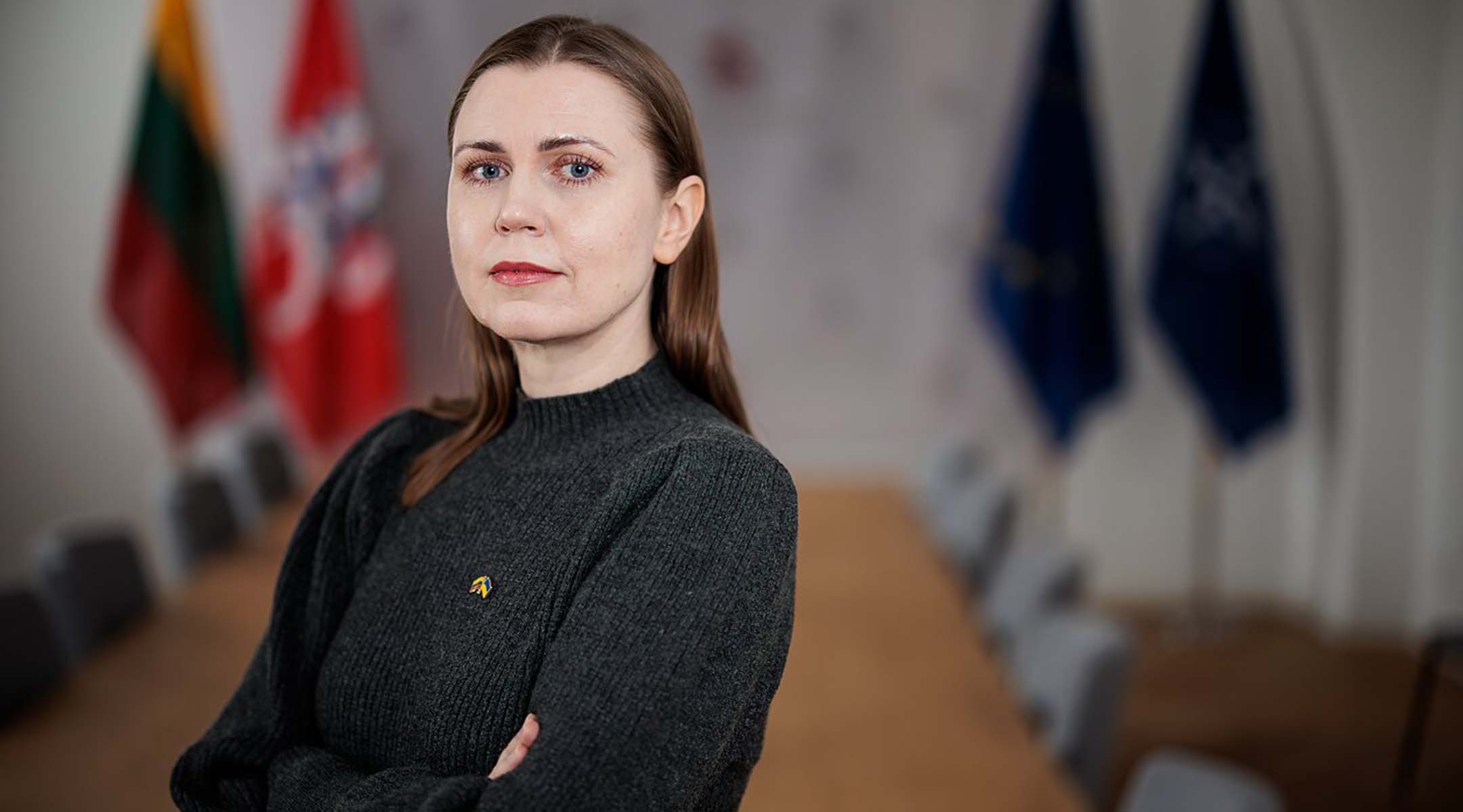
IRAN WILL NOT BE ABLE TO CONTINUE SUPPLYING RUSSIA MILITARILY AT THE SAME LEVEL AS BEFORE
– Madam Minister, you also mentioned about this triangle between Europe, Indo-Pacific and the Middle East. How do you think the current tension in the Middle East, how it might affect the war in Ukraine, or international efforts for peace and the overall geopolitical situation?
– So first of all, of course, this war is currently drawing the attention of the United States away from Ukraine and toward the Middle East, and Europe is also closely following what is happening there.
But in the long term, this may be for the better, because Iran—one of the four members of the “axis of evil”—is being significantly weakened, and will probably continue to be so. Russia is losing its credibility in the Middle East—in Syria, and now with Iran. We see that Russia can only express concern, but it cannot actually participate or provide any real military help.
Now, number three is supply. Iran will not be able to continue supplying Russia militarily at the same level as before. So in the long term, again, that is positive when we talk about Ukraine.
And the most important strategic factor is that the United States has shown very clearly how a war involving NATO would look. That is a very clear warning to Russia. In the long term, this could help them recalculate the scope of their imperial ambitions.
UKRAINE COULD BECOME A STRONG MILITARY POWER AND KEY DEFENDER OF EUROPEAN SECURITY
– And the final question, Madam Minister. Looking ahead, how do you see the future of Lithuania, Ukraine, and Europe as a whole? Based on where things stand now, what’s your outlook for the region’s security and stability over the next few years or quarter-century?
– Honestly, I think that until 2030, we are still going to live through this decade of wars. It’s going to be very difficult, very complex and full of tensions. The growing number of hotspots all over the world is going to bring more anxiety, uncertainty, and difficult decisions.
I’m not going to beat around the bush. I’ve always been very frank about this. So I won’t lie—it’s going to be difficult. But my hope is that if we learn certain lessons, we can come out of this stronger. Democracy, democratic part of the world is now a minority. And maybe we can stop this process.
Ukraine is the largest country in Europe. And if we are able to help Ukraine, if Ukraine is saved, if Russia would stop its imperial expansion – then with Ukraine’s capacity, and with the identity of the Ukrainian nation now stronger than ever, we face the possibility of having a very strong country within Europe – one with huge military capacity, with huge military expertise against the main threat for Europe and a huge potential of defense industry, which is crucial for the long-term stability and security of Europe.
And if further events develop within the Indo-Pacific and Europe simultaneously, I’m quite sure which side Ukraine is going to stand on. And I’m quite sure that if we have to face even bigger challenges to our joint security, we will win, because Ukraine is going to be a very important partner.
Madam Minister, thank you sincerely for this interview, for your time, and for the unwavering support that Lithuania and the Lithuanian people continue to extend to Ukraine. This support is deeply meaningful and truly priceless to us. We are profoundly grateful. I wish you every success in your participation in the NATO Summit.
Olga Budnyk, Vilnius-Ankara
Photo courtesy of LRT, ELTA
Source: Dovile Sakaliene, Minister of National Defense of Lithuania

